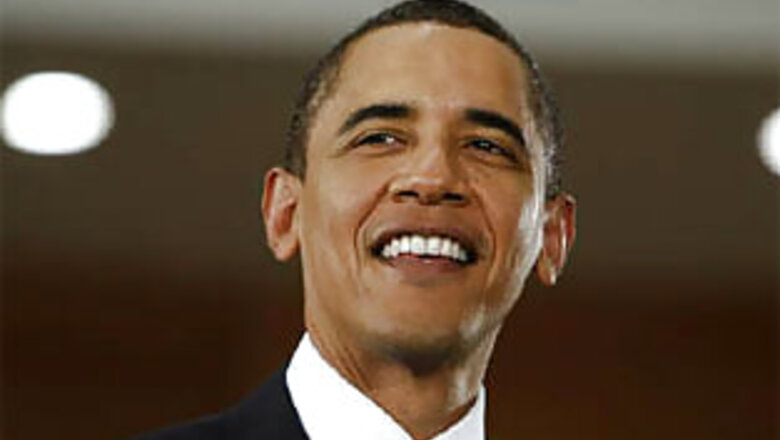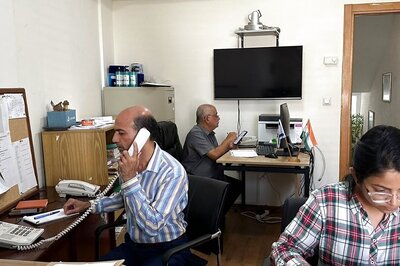
views
Washington: The Obama administration is shifting the focus of its Iran policy from talk to sanctions, but the prospect of winning early international support for toughened new penalties appears dim.
Equally problematic is finding a set of sanctions that would have a significant impact on the prime target of American and international worry: Iran's suspected pursuit of an atom bomb. Three rounds of UN sanctions, dating to December 2006 and aimed mainly at squeezing Iran's nuclear work, have had little apparent effect.
The administration may get an early indication of its prospects at a huddle Friday in Brussels with senior diplomats from the four other permanent members of the UN Security Council — Russia, China, Britain and France — plus Germany. Any decisions on new Iran sanctions, though, probably are weeks away.
The administration has tried for months to draw Iran into talks to resolve international worries that its declared intent to develop a civilian nuclear power network is cover for a secret nuclear weapons program. The Iranians have shown little interest, while denying any clandestine nuclear ambition.
The diplomacy, while unsuccessful so far, may improve the administration's chances on sanctions by demonstrating to the Europeans, Chinese and others that Washington has at least tried to find an accommodation with Iran.
"Many of them are still instinctively against sanctions, but Iranian intransigence has put them in a bind," said Karim Sadjadpour, an Iran expert at the Carnegie Endowment for International Peace, a think tank.
President Barack Obama said in South Korea on Thursday that because the Iranians rejected a UN proposal to ship most of Iran's low-enriched uranium out of the country, "we have begun discussions with our international partners" about new pressure tactics. He said "a package of potential steps" against the Iranians would be developed over the next several weeks. He was not more specific.
The uranium gambit was seen as a way of getting Iran to open up, but on Wednesday Iranian Foreign Minister Manochehr Mottaki appeared to close that door by saying Iran would not send its uranium abroad. The uranium, if enriched sufficiently, could be used to produce a nuclear weapon, although Iran insists it is intended as fuel to power a planned network of civilian nuclear power reactors.
If, as some suspect, China and perhaps Russia balk at imposing new sanctions on Iran, the United States could enact its own penalties and coordinate them with the European Union, as it has done in the past. The administration's first choice, however, is to get the UN Security Council to ratchet up the pressure.
One possibility is to strengthen existing UN sanctions such as a March 2008 provision for financial monitoring of certain banks with suspected connections to the illicit spread of nuclear technologies.
Both chambers of Congress are considering legislation that would give Obama a broad new array of authority to target Iran's energy sector by penalizing foreign companies that sell and ship refined oil products to Iran. Despite Iran's large oil holdings, it has limited capacity to make refined products like gasoline.
Obama has expressed confidence that he can persuade allies to join him in getting tougher on Iran, given widespread opposition to a nuclear-armed Iran. But it is far from clear that China, which has strong and growing commercial and investment ties to Iran, would go along. Russia's intentions also are unclear, although Russian President Dmitry Medvedev said in September that sanctions may be inevitable. Like the other permanent members of the UN Security Council, both Russia and China can stop any resolution by veto.
Stephen P. Cohen, president of the Institute for Middle East Peace and Development, said it is no surprise that China has not publicly expressed a willingness to consider new sanctions, even if it might eventually go along. More significant, Cohen said, are recent Russian statements suggesting possible support.
"This is probably why the president thinks that he can discuss sanctions now without it being blown out of the water within five minutes by the Chinese and the Russians," Cohen said in a telephone interview.
Trita Parsi, president of the National Iranian American Council, is doubtful of a positive turn of events, in part because he sees the Iranian leaders in turmoil following a disputed presidential election in June.
That might be why, he suggested, that Iran has shown little interest in a separate International Atomic Energy Agency offer to provide nuclear fuel for an Iranian research reactor in exchange for Iran's shipping the majority of its low-enriched uranium to Russia or another country.
"You may have a political system (in Tehran) that is so fractured, that is so at each others throat, that they are incapable of making a decision of this magnitude," Parsi said.



















Comments
0 comment